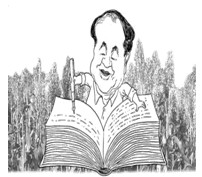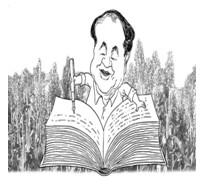
題目列表(包括答案和解析)

Born into a farmer’s family, life was not easy when I was a kid. We were so poor that we often did not know where our next meal was coming from. I had to sell cabbages at the marketplace to support my family.
A storyteller once came to the marketplace, and I went to listen to him. My mother was unhappy with me for forgetting my job. But that night, while she was making clothes for us under the weak light of an oil lamp, I couldn't help retelling stories I'd heard that day. She listened impatiently at first, since in her eyes professional(職業(yè)的) storytellers were smooth-talking men—nothing good ever came out of their mouths. But slowly she was attracted by my retold stories, and from that day on, she never gave me any task on market days, unspoken agreement to enjoy new stories. As a repayment(回報)for Mother's kindness and a way to show off my memory, I'd retell the stories for her in lively detail. Soon, she wasn't the only member of my audience, which later included my elder sisters, my aunts, even my stubborn grandmother.
I knew she was worried about me. Talkative kids are not well thought of in our village, for they can bring trouble to themselves and to their families when they talk too much. Mother often reminded me not to talk so much, wanting me to be a silent and modest teenager. However, my natural desire(渴望)to talk never went away, and that is what makes my name – Mo Yan, which means ‘no speaking’. This strong wish to talk also improved my ability to express myself, which is important for writers who are also considered as storytellers.
【小題1】Mo Yan lived a/an ________ life when he was young.
| A.hard | B.colourful | C.easy | D.rich |
| A.little Mo Yan was interested in selling vegetables |
| B.his mother was attracted by the retold story at first |
| C.his mother didn’t let him listen to the new stories again |
| D.little Mo Yan had quite a good memory |
| A.Because she thought they never said anything good. |
| B.Because she thought they couldn’t make much money. |
| C.Because she thought they would affect Mo Yan’s schoolwork. |
| D.Because she thought most people didn’t like listening to stories. |
| A.silent | B.modest | C.talkative | D.trouble-making |
| A.My Unlucky Childhood | B.A Storyteller’s Childhood |
| C.My Kind Grandmother | D.More talking leads to success |

Born into a farmer’s family, life was not easy when I was a kid. We were so poor that we often did not know where our next meal was coming from. I had to sell cabbages at the marketplace to support my family.
A storyteller once came to the marketplace, and I went to listen to him. My mother was unhappy with me for forgetting my job. But that night, while she was making clothes for us under the weak light of an oil lamp, I couldn't help retelling stories I'd heard that day. She listened impatiently at first, since in her eyes professional(職業(yè)的) storytellers were smooth-talking men—nothing good ever came out of their mouths. But slowly she was attracted by my retold stories, and from that day on, she never gave me any task on market days, unspoken agreement to enjoy new stories. As a repayment(回報)for Mother's kindness and a way to show off my memory, I'd retell the stories for her in lively detail. Soon, she wasn't the only member of my audience, which later included my elder sisters, my aunts, even my stubborn grandmother.
I knew she was worried about me. Talkative kids are not well thought of in our village, for they can bring trouble to themselves and to their families when they talk too much. Mother often reminded me not to talk so much, wanting me to be a silent and modest teenager. However, my natural desire(渴望)to talk never went away, and that is what makes my name – Mo Yan, which means ‘no speaking’. This strong wish to talk also improved my ability to express myself, which is important for writers who are also considered as storytellers.
【小題1】Mo Yan lived a/an ________ life when he was young.
| A.hard | B.colourful | C.easy | D.rich |
| A.little Mo Yan was interested in selling vegetables |
| B.his mother was attracted by the retold story at first |
| C.his mother didn’t let him listen to the new stories again |
| D.little Mo Yan had quite a good memory |
| A.Because she thought they never said anything good. |
| B.Because she thought they couldn’t make much money. |
| C.Because she thought they would affect Mo Yan’s schoolwork. |
| D.Because she thought most people didn’t like listening to stories. |
| A.silent | B.modest | C.talkative | D.trouble-making |
| A.My Unlucky Childhood | B.A Storyteller’s Childhood |
| C.My Kind Grandmother | D.More talking leads to success |

| A.hard | B.colourful | C.easy | D.rich |
| A.little Mo Yan was interested in selling vegetables |
| B.his mother was attracted by the retold story at first |
| C.his mother didn’t let him listen to the new stories again |
| D.little Mo Yan had quite a good memory |
| A.Because she thought they never said anything good. |
| B.Because she thought they couldn’t make much money. |
| C.Because she thought they would affect Mo Yan’s schoolwork. |
| D.Because she thought most people didn’t like listening to stories. |
| A.silent | B.modest | C.talkative | D.trouble-making |
| A.My Unlucky Childhood | B.A Storyteller’s Childhood |
| C.My Kind Grandmother | D.More talking leads to success |
Some people have a very poor sense of direction. Unluckily, I am one of them. I have visited a place many times but I may still get lost there the next time.
When I was a little girl, I never dared to ask strangers the way. And so I used to walk around in circles and hope that by chance I would get to the place I was going to.
Now, I am no longer too shy to ask people for directions, but I often receive helpless or even wrong information. So I try to avoid giving people wrong directions. If anyone ever asks me the way somewhere, I would say, “Sorry, I am a stranger here.”
Once on my way to work I was stopped by a man. He asked me if I could tell him the way to the Friendship Building. I gave him my usual reply. But just as I walked on only a few steps. I realized that he had asked the way to my office building. However, I had no time to turn back and look for him. I was rushing to meet with someone at my office and I didn’t want to keep him waiting.
When I just got to my office, the secretary(秘書) showed in the man who had asked me for directions. Imagine how embarrassed I was and how surprised he was when we saw each other at the first sight.
【小題1】The writer always refuses to give people directions because _____________.
| A.she is a stranger to the city | B.she doesn’t know the people |
| C.she has no time to help others | D.she’s afraid of giving wrong direction |
| A.sell her something | B.a(chǎn)sk her the time |
| C.make friends with her | D.a(chǎn)sk for the direction |
| A.lives | B.studies | C.works | D.teaches |
| A.尷尬 | B.困惑 | C.激動 | D.拮據(jù) |
| A.The writer is too shy to give others directions. |
| B.The writer has a very poor sense of direction. |
| C.The writer never got lost when she was young. |
| D.The man was quite nervous when he saw the writer. |
| A.she is a stranger to the city | B.she doesn’t know the people |
| C.she has no time to help others | D.she’s afraid of giving wrong direction |
| A.sell her something | B.a(chǎn)sk her the time |
| C.make friends with her | D.a(chǎn)sk for the direction |
| A.lives | B.studies | C.works | D.teaches |
| A.尷尬 | B.困惑 | C.激動 | D.拮據(jù) |
| A.The writer is too shy to give others directions. |
| B.The writer has a very poor sense of direction. |
| C.The writer never got lost when she was young. |
| D.The man was quite nervous when he saw the writer. |
湖北省互聯(lián)網(wǎng)違法和不良信息舉報平臺 | 網(wǎng)上有害信息舉報專區(qū) | 電信詐騙舉報專區(qū) | 涉歷史虛無主義有害信息舉報專區(qū) | 涉企侵權(quán)舉報專區(qū)
違法和不良信息舉報電話:027-86699610 舉報郵箱:58377363@163.com